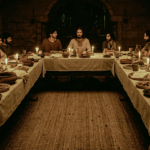October 5 – Matthew 21: 33-46
This parable reads like a soap opera, with intimidation, coercion and even murder. The tenants of the vineyard try to escape the solemn contract they have made with the owner, and attempt by foul means to claim it. But just as the perpetrators think they have got away with such crimes, they discover their assumed inheritance has been forfeited and they have been rejected.
Watching the news today may incline one to think that wicked people who would be rulers often get away with it. But this is not the message of the parable. The hope of the parable is that despite the chaos, God’s plan will eventually triumph over human frailty and wickedness, and from the midst of death and suffering, new life will persist in emerging.
October 12 – Matthew 22: 1-14
In this parable Jesus again uses a familiar event, a wedding, to talk about the kingdom of heaven.
The first invited guests reject Jesus’ invitation and persecute his followers. The invitation is then broadened to include all people, both good and bad. However, the final verses indicate that righteousness (the wedding garment) is still an.
Like Matthew’s ill-clad wedding guest, it is very easy for us to identify with the righteous. It is easy to enter the church, join in the Christian community and espouse a life of faith. In his Gospel, Matthew recognises that such actions are not necessarily indicative of true faith. The same is true today. Only by consciously living out our faith, through our words and our deeds, can we truly hope to be numbered among those at the banquet table.
October 19 – Matthew 22:15-22
Jews living in the Palestine area before the destruction of the temple in 70 CE had an obligation to pay at least two types of taxes. The first was known as the ‘temple tax’. The second was the tax that all residents in the Roman Empire had to pay direct to the Roman administrators.
Jesus has been presented with a question that is clearly a trap. The Pharisees see him as a troublesome blasphemer, and the Herodians, who support the Romans, will damn him no matter what he says. It is a classic dilemma – a “yes” will confirm he is a blasphemer, a “no” will damn him as a revolutionary.
Jesus foils their plot by showing a third way. He gives what is due to God and to Caesar. He neither collaborates with, nor speaks violently against, the Roman oppressor. As such, Jesus transcends the dilemma of the trap laid for him.
Jesus was not a revolutionary who set out to win people to his cause by championing political freedom for Israel. He concedes there is a restricted duty owed to the government, but balances this with the more important command to give God what is God’s. Jesus teaches that it is our very selves we render to God, not a token amount of money.
October 26 – Matthew 22:34-46
Which commandment is the greatest? Jesus’ answer is simple: love God with all your heart, and such love will be reflected in love for neighbour.
This double command, to love God and neighbour, has been deeply imbedded in the psyche of the Christian church throughout its history. It many ways it has become the fundamental principle of how we understand the heart of Christian faith.
This double command, to love both God and neighbour, is truly powerful. It at once gives to God the reverence and obedience that God is due, and it allows us to treat others as we would have God deal with us – with forgiveness, mercy and grace.
The Lectionary Reflection was prepared by the Rev. Elizabeth Raine who ministers at Wauchope Uniting Church and is the Southern Zone Minister for Mid North Coast Presbytery














